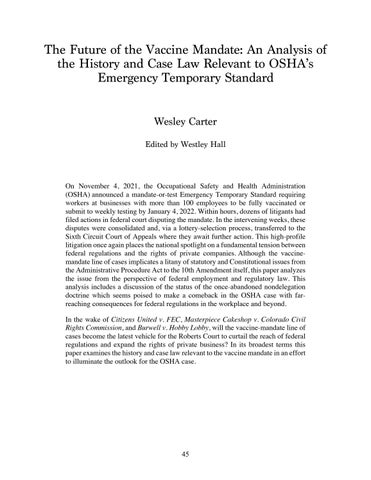The Future of the Vaccine Mandate: An Analysis of the History and Case Law Relevant to OSHA’s Emergency Temporary Standard Wesley Carter Edited by Westley Hall
On November 4, 2021, the Occupational Safety and Health Administration (OSHA) announced a mandate-or-test Emergency Temporary Standard requiring workers at businesses with more than 100 employees to be fully vaccinated or submit to weekly testing by January 4, 2022. Within hours, dozens of litigants had filed actions in federal court disputing the mandate. In the intervening weeks, these disputes were consolidated and, via a lottery-selection process, transferred to the Sixth Circuit Court of Appeals where they await further action. This high-profile litigation once again places the national spotlight on a fundamental tension between federal regulations and the rights of private companies. Although the vaccinemandate line of cases implicates a litany of statutory and Constitutional issues from the Administrative Procedure Act to the 10th Amendment itself, this paper analyzes the issue from the perspective of federal employment and regulatory law. This analysis includes a discussion of the status of the once-abandoned nondelegation doctrine which seems poised to make a comeback in the OSHA case with farreaching consequences for federal regulations in the workplace and beyond. In the wake of Citizens United v. FEC, Masterpiece Cakeshop v. Colorado Civil Rights Commission, and Burwell v. Hobby Lobby, will the vaccine-mandate line of cases become the latest vehicle for the Roberts Court to curtail the reach of federal regulations and expand the rights of private business? In its broadest terms this paper examines the history and case law relevant to the vaccine mandate in an effort to illuminate the outlook for the OSHA case.
45

